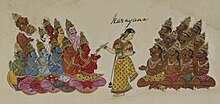Mohini

Mohini ( Sanskrit मोहिनी Mohinī ) is a form of the Indian god Vishnu in which he appears as a beautiful woman.
In the myth of the Milky Ocean , from which the nectar of immortality ( Amrita ) is obtained, the gods ( devas ) and demons ( asuras ) fight against each other. Vishnu then appears as Mohini to distract the Asuras. The gods can therefore escape with the nectar.
The Indian god Shiva and Mohini fall in love and create Ayyappan (also Shasta, Hariharaputra). In another version of the myth, Aiyanar is born. Ayyappan is worshiped in Kerala in the Sabarimala temple and Aiyanar is worshiped in Tamil Nadu as a Gramadevata (village deity) who is said to protect against calamity.
The classical Indian dance form is also called Mohiniattam after Mohini . This refers to the myth of the Milky Ocean and the myth in which Vishnu, as Mohini, performs a dance called muktanrtya, 'dance for the liberated', to protect Shiva from the demon Bhasma.
literature
- Keyword Mohini . In: Denise Cush, Catherine Robinson, Michael York (Eds.): Encyclopedia of Hinduism. Routledge, London (et al.) 2008, pp. 504f
